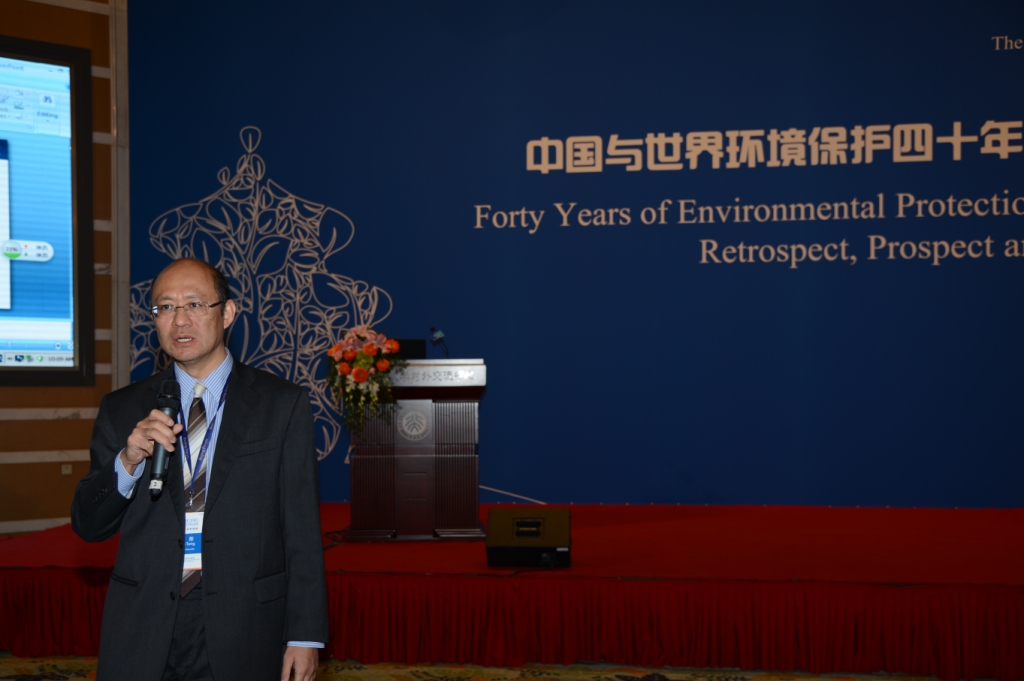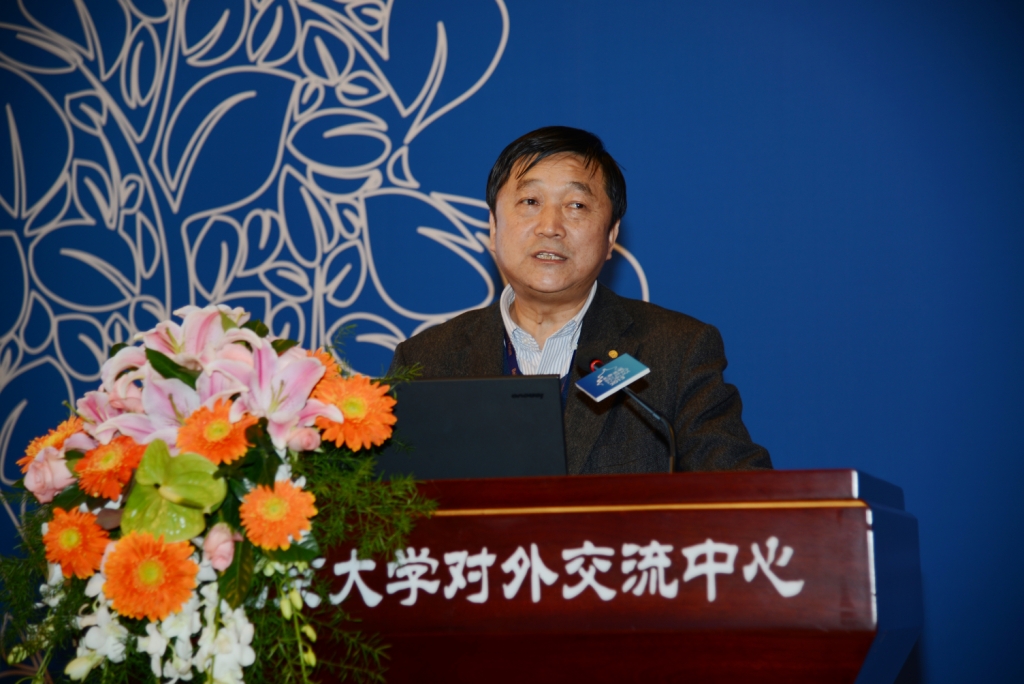
The second session of Beijing Forum (2013) Panel IV—“Forty Years of Environmental Protection in China and the World: Retrospect,Prospect and Institutional Innovation”was held at Sunshine Hall, Yingjie Exchange Center of Peking University on the morning of Nov.2nd,2013.The theme of this session is “China under the Global Context”. Professor Zhang Shiqiu from College of Environmental Science and Engineering of Peking University and Professor Zhu Tong, the dean of College of Environmental Science and Engineering of Peking Universityco-chaired the session.

Figure 1. Professor Zhu Tong
Research Professor Nay Htun from Stony Brook University and who was formerly with UNEP and UNDP where he held the rank of UN Assistant Secretary General at both organizations served as the first speaker to discuss “Environment and Humanity: Past, Present, Future”. His presentation is in three parts, underscoring the irrevocable symbiotic relationship between the environment and humanity throughout the history of human civilization.The first part is a brief overview of the past millennia, highlighting the philosophy and practice that links humanity and nature. The second part is a review of the contemporary situation driven by the advent of the industrial revolution. The third part is an observation of the fast emerging trends and the unfolding prospects for the future which have profound implications and consequences for the environment, ecosystem functions that support life systems, and human civilization. He further pointed out that the occurrence of multiple high intensity stressors has been a pre-requisite for all the five global extinction events of the past 600 million years, and he called the society and government to responds the challenges through Carbon revolution, resource and material revolution, behavioral revolution.

Figure 2. Professor Nay Htun
Wang Jinnan, Chief Engineerof Chinese Academy for Environmental Planning elaborated the lessons learned and future targets in forty years of environmental protection in China. He firstly stated that organizations of Chinese environmental protection areflourishingand legislation system on environmental protectionhas been built initially with its advanced economy. Combining some statistical results, he illustrated unfortunatefacts to demonstrate that China still repeatedly adopted the development model of “pollution first, treatment later” like western countries. That is, high speed of economy increase in China came from over-consumptionresource, which brought uncounted problem on the safety of drinking water, air pollution, climate change and so on. Given this, he pointed out although Chinese environmental protection idea advanced with the times and world in recent 40 years, related targets on environmental protection could not confirm to that.
What is the characteristics and specific role of China on environmental protection? Dr. Donald Barnes who formerly served as the director of US EPA's science advisory committee addressed this question by combining his experience on environmental protection in US EPA and his experiences teaching in China, He firstly made an example in his childhood days that the occurrence of similar environmental events in different locations led people to “connect the dots” and thereby draw a bigger picture of conditions on a larger scale. He pointed out that severe pollutionsevents brought growing public awareness on environmental protection and institutional innovation to the United States and other countries as well as China. He further emphasis that as a part of global community, China has been experiencing and suffering the same challenges of other developed countries, however, opportunities are existed especially as a late developed economy, China should have the opportunity to avoid the failures of other countries by learning the experiences and learn the lessons and price paid by other countries. Dr. Barnes further state that China’s academic society and policy makers can be also benefited from the current development technology especiallythe IT. He suggested that Chinatake advantage of mobile devices, smart phones etc.to better use the big data to promoteenvironmental protection. And of course, he also stated that practical difficulties existed, for example, approaches of integrating the data and verifying the resource of the data.
Professor Wang Yi from Chinese Academy of Sciences expressed his views for “An Overarching Design for Eco Civilization Development in China”. Under the background of discussion on ecological civilization arrangement in the 18th National Congress of the Communist Party of China, he pointed out that the biggest problem we faced in ecological civilization practice was lack of a top-level design including technical, financial, institutional aspects and so on. In the next 10 to 20 years, Chinese resource consumption would reach the peak and it will bea huge challenge for the government on how to make the right judgments in this rapid transformation period. He further noted that China should sum up the experience and lessons from practice in the bottom-up process, including from only controlling production side to controlling both production and consumer side. He also suggested that we should strengthen inter-sectoral, inter-regional and international coordination and cooperation to explore a sustainable development model.
Professor Meng Wei from Chinese Research Academy of Environmental Sciencesdelivered the speech titled“Retrospect and prospect of water environment protection in China”. His presentation startedwith a brief introduction of historical research studies on China’s water environment management, pointing out the research focuses on assimilative capacity of water environment, water function zoning, integrated basin planning on water pollution prevention, and pollutantdischarge permit system to form the basis for the system of China’s water environmental protection and management. During the “Ninth and Tenth Five-Year-Plan”, the theory and applied technology on the total pollutant load control were continuously developed and deepened, and the control target of the total pollutant discharge for the Ninth Five-Year-Plan was completely achieved. Based on this technological system, China developed water pollution control planning for the major basins, which played an active role in the control of pollutants discharges and mitigation of rapid deterioration of water quality. However, as these management systems are based on the targeted total load control, it fails to link the water quality target with the pollutant load control, and it is difficult to meet the requirement for China’s water environment management.Therefore, in accordance with Chinese water environment conditions, the integrated water environment management based on “zoning, classification, gradation, and phasing” is the technical basis for China’s water environment protection in the future.Compared withprotection of the water quality, to achieve aquatic ecosystem health is the higher goal including the requirement of human health.Given for this, to enhance water environmental protection to the height of “eco-civilization building” is an inevitable way to “accomplish sustainable development of the Chinese society”.

Figure 3. Professor Meng Wei
Professor Ma Zhong, the dean of School of environment and natural resourcesof Renmin University of China presented his speech on “Empirical research on water pricing policy in China”. His presentation mainly focused on three aspects: 1) introduction to China’s water resources and water environmental condition;2) analysis of water pricing policies; and 3) recommendations for improvement of water pricing policy. In China, a variety of development activities such as livelihood, industrialization and agriculture are greatly depending on water resources, though the level of wastewater discharge has been increasing in the recent decade, which imposes massive threats to China’s water resources and become main limitation of social economic development. He pointed out that the inappropriate water pricing policy such as exclusion of non-treated wastewater discharge and failures of considering non-degraded environmental principle in the system are the main causes for ineffectiveness of the system in water saving and reduction of wastewater discharge. Therefore, heputs forward basic principles of water pricing policies and pricing method for establishing standards based on non-degradation of environment. Basic principles of water pricing policies including non-degradation of environment, full-cost pricing and separation of public and commercial services have significant economic and environmental benefits.Thus,recommendations he proposed areon the reinforcement of supervision, management of water pricing policiesand the decentralization of water pricing to local governments with the macro-guidance of central government.
Debra Tan, from ADM Capital Foundation gave her talk on the topic of “Water: shaping China’s food & energy choices”. Her presentation starts with the statement that water supply crisis is global risk by livelihood and potential impacts, even getting worse in China. Further specific data showsthat a total of 11 provinces, municipalities and autonomous regions confront water shortage in China, including the economic and agricultural powerhouses of Jiangsu and Shandong as well as the municipalities of Beijing, Shanghai and Tianjin. These 11 provincestakeaccount for 38% of agricultural output, 53% of ensured coal reserves, 51% of industrial output and 45% of GDP,clearly illustrating the importance of the allocation and management of water inagriculture, industry and energy. Therefore, she cited that managing the water supply crisis, economic growth and society will be a fine balancing act for Chinese governments. Rethinking innovation to achieve balance within the “environment-economy-society” space is crucial. Decisions made at the nexus to balance “environment-economy-society” could shape China’s food and energy choices. China’s future environmental solutions could change the global commodities trade and perhaps even alter the way industries work, thereby placing China in the driving seat.
At the end of the second session, Professor Zhang Shiqiu and Professor Zhu Tong made very brief but illuminating summary remarks on the speakers’ presentations.